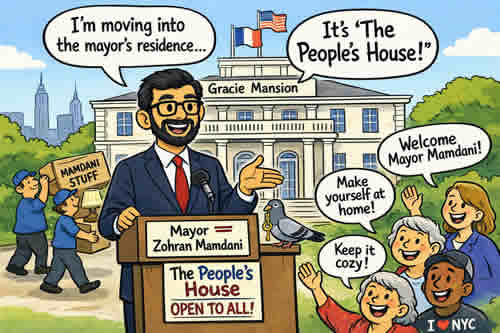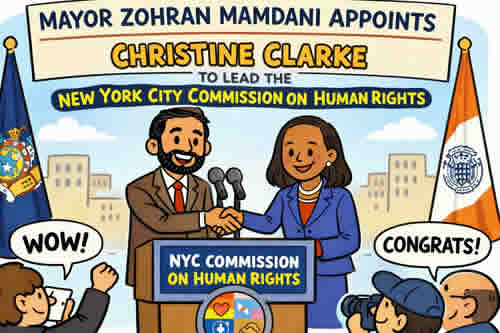New York City Council: In the FY26 city budget, the Council secured $3M for the Culturally Specific Gender-Based Violence Initiative. This first-of-its-kind initiative will provide funding directly to grassroots organizations that support domestic violence survivors in immigrant communities.
From a common-sense perspective and considering the interests of New York City, there are several reasons why allocating $3 million for the Culturally Specific Gender-Based Violence Initiative, while well-intentioned, could be seen as problematic or misguided:
- Limited Scope and Potential Inequity: The initiative focuses specifically on domestic violence survivors in immigrant communities. While supporting these communities is important, prioritizing one demographic group over others risks neglecting the broader population of domestic violence survivors. Common sense suggests that domestic violence affects people across all communities, regardless of cultural or immigration status. A more equitable approach would allocate funds to support all survivors citywide, ensuring no group is left underserved. By narrowing the focus, the initiative may inadvertently exclude other vulnerable groups, such as low-income residents, non-immigrant minorities, or the elderly, who also face significant barriers to accessing support.
- Small Funding for a Large Problem: Domestic violence is a pervasive issue in a city as large as New York, with over 8 million residents. Allocating only $3 million to a niche initiative seems inadequate given the scale of the problem. Common sense dictates that such a limited budget might not achieve meaningful impact, especially when spread across multiple grassroots organizations. The funds could be better directed toward broader, more established programs with proven effectiveness, such as shelters, legal aid, or counseling services, which benefit a larger number of survivors across the city.
- Administrative and Oversight Challenges: Directing funds to grassroots organizations, while admirable for supporting community-based efforts, raises concerns about accountability and efficiency. Smaller organizations may lack the infrastructure to manage public funds effectively, potentially leading to waste, mismanagement, or inconsistent service quality. From the city’s perspective, ensuring taxpayer money is used efficiently is critical. Established nonprofits or city-run programs might be better equipped to deliver services at scale, with stricter oversight to ensure funds are used effectively.
- Duplication of Existing Services: New York City already has numerous programs and organizations addressing domestic violence, such as Safe Horizon, the New York City Family Justice Centers, and other state-funded initiatives. Creating a new, narrowly focused initiative risks duplicating efforts, which could dilute the impact of existing programs. Common sense suggests that strengthening or expanding proven services would be more practical than launching a new initiative that may overlap with what’s already available.
- Neglecting Root Causes: While supporting survivors is crucial, the city’s interests are also served by addressing the root causes of domestic violence, such as poverty, housing instability, and lack of access to education or mental health services. The $3 million could be better invested in preventive measures—like job training, affordable housing, or community education programs—that reduce the incidence of domestic violence across all communities, benefiting the city as a whole by fostering safer, more stable neighborhoods.
- Opportunity Cost: In a city with a tight budget and competing priorities, $3 million could address other pressing needs that benefit a broader population. For example, investing in public safety, infrastructure, or homelessness prevention could have a wider impact on the city’s well-being. Common sense suggests that funds should be allocated to maximize benefits for the greatest number of residents, especially when resources are limited.
In summary, while the initiative aims to address a real issue, its narrow focus, limited funding, potential for inefficiency, and overlap with existing services raise concerns. From the city’s perspective, a more inclusive, efficient, and impactful approach would prioritize broader support for all domestic violence survivors, strengthen existing programs, or address underlying causes to benefit the entire city.
The claim that cohabitation between genders other than man and woman constitutes “spiritual violence” is a subjective perspective often rooted in specific ideological, religious, or cultural beliefs. From a common-sense standpoint and considering the interests of a city like New York, this view raises complex questions about personal freedom, societal harmony, and the definition of harm.
Understanding the Claim
- “Spiritual Violence”: This term typically refers to non-physical harm that affects someone’s spiritual or emotional well-being, often tied to beliefs about morality, sin, or cosmic order. For those who hold this view, cohabitation between non-binary, transgender, or other gender identities (outside the traditional man-woman binary) may be seen as violating sacred or natural laws, causing spiritual distress to individuals or communities who believe in strict gender roles.
- Context of the Claim: Such a perspective might stem from religious doctrines, traditionalist views, or personal convictions that uphold a binary gender framework as divinely ordained or biologically absolute. The claim implies that the mere act of cohabitation by non-traditional genders inherently causes harm, even without direct physical or verbal aggression.
Why This Perspective Is Problematic in a City Context
From a common-sense perspective and in the interests of a city like New York, labeling cohabitation between non-traditional genders as “spiritual violence” is contentious for several reasons:
- Subjectivity of Harm:
- Common Sense: Harm, especially non-physical harm like “spiritual violence,” is subjective and depends on individual or cultural beliefs. What one person sees as spiritually harmful (e.g., non-binary cohabitation), another may see as a fundamental expression of personal freedom and identity. In a diverse city, imposing one group’s spiritual framework on others risks alienating large swaths of the population.
- City Interests: New York thrives on diversity, with over 8 million residents spanning countless cultures, religions, and identities. According to city demographics, a significant portion of the population identifies as LGBTQ+, with estimates suggesting 4-10% of adults are non-heterosexual or non-cisgender. Labeling their cohabitation as inherently harmful could foster division, undermine social cohesion, and contradict the city’s commitment to inclusivity (e.g., policies like the NYC Human Rights Law protecting gender identity).
- Freedom of Personal Choice:
- Common Sense: Cohabitation is a private decision between consenting adults. Declaring it “spiritual violence” implies that individuals should conform to a specific moral or gender framework, which conflicts with the principle of personal autonomy. Most people would agree that adults should have the right to live with whomever they choose, provided no tangible harm (e.g., abuse) occurs.
- City Interests: Restricting cohabitation based on gender identity would violate legal protections and practical realities. New York’s housing market is already strained, with high costs forcing many to share living spaces. Policing who can cohabit based on spiritual objections would be unenforceable and economically disruptive, increasing housing instability.
- Lack of Tangible Harm:
- Common Sense: For an act to be considered violence, it typically requires demonstrable harm to others. Cohabitation between non-traditional genders doesn’t inherently cause physical, economic, or emotional damage to third parties. Claiming it causes “spiritual” harm relies on abstract beliefs, which are difficult to quantify or legislate without infringing on others’ rights.
- City Interests: Public policy in a city focuses on measurable outcomes—crime rates, health, economic productivity. Spiritual concerns, while valid to individuals, are less actionable for governance. For example, domestic violence (a tangible harm) costs cities billions annually, whereas cohabitation disputes based on spiritual beliefs rarely register as public issues. Prioritizing the latter over pressing needs like housing or safety would misalign with the city’s goals.
- Potential for Discrimination:
- Common Sense: Labeling certain cohabitation arrangements as “violence” risks justifying discrimination against non-binary or transgender individuals. Historically, similar arguments have been used to stigmatize interracial or same-sex relationships, which are now widely accepted. This could lead to social exclusion or even real violence against marginalized groups.
- City Interests: New York has a legal and cultural commitment to protecting marginalized communities. The NYC Human Rights Commission actively combats discrimination based on gender identity. Framing non-traditional cohabitation as “spiritual violence” could fuel prejudice, increase hate crimes (which rose 11% against LGBTQ+ individuals in NYC from 2020-2022), and undermine the city’s reputation as a global hub of tolerance.
- Pluralistic Society:
- Common Sense: In a city where people hold countless spiritual beliefs—Christianity, Islam, Judaism, atheism, etc.—no single definition of “spiritual violence” can dominate. One group’s spiritual harm may be another’s spiritual liberation. For example, non-binary individuals might argue that being forced to conform to a binary gender is itself spiritually violent.
- City Interests: Promoting harmony in a pluralistic society requires respecting diverse lifestyles. Initiatives like the $3M Culturally Specific Gender-Based Violence program you mentioned aim to protect vulnerable groups, including those facing violence due to gender identity. Dismissing non-traditional cohabitation as harmful could alienate communities the city seeks to support, reducing trust in public institutions.
Acknowledging the Perspective
While problematic in a city context, the view that non-traditional gender cohabitation is “spiritual violence” deserves acknowledgment:
- Belief Systems: For some, gender roles are central to their worldview, often tied to religious texts or cultural traditions. They may genuinely feel that deviations from these norms disrupt spiritual harmony, causing distress.
- Community Concerns: In certain communities, non-traditional cohabitation might be seen as challenging family structures or moral norms, leading to perceived social erosion. This concern isn’t unique to gender issues—similar debates surround cohabitation before marriage or polyamory.
- Freedom to Believe: Just as individuals have the right to cohabit as they choose, others have the right to hold beliefs about what constitutes spiritual harm, provided they don’t impose those beliefs through coercion or discrimination.
However, in a city like New York, these beliefs must coexist with others’ rights to live freely. Common sense suggests that personal convictions shouldn’t override others’ autonomy, especially when no concrete harm is proven.
Conclusion
Labeling cohabitation between genders other than man and woman as “spiritual violence” is a subjective claim that clashes with the realities of a diverse, pluralistic city like New York. From a common-sense perspective, it lacks evidence of tangible harm, infringes on personal freedom, and risks fostering discrimination. In the city’s interests, promoting inclusivity, legal protections, and social harmony outweighs enforcing one group’s spiritual framework. While individuals are entitled to their beliefs, public policy should prioritize measurable issues like actual violence or housing equity over abstract spiritual concerns.
Sources: New York City Council , Big New York news BigNY










